Core
Rules
schematic
Executes a set of rules by outputing first the name of the associated schematic to the console.
The schematic name will be prefixed by the word "SCHEMATIC" printed in magenta and given options can follow inlined, stringified and printed in gray if verbose mode is activated.

import { schematic } from '@hug/ngx-schematics-utilities';
import { Rule } from '@angular-devkit/schematics';
export default (options: any): Rule =>
schematic('my-schematic', [
...
]);
rule
Executes a rule.
import { rule, schematic, workspace } from '@hug/ngx-schematics-utilities';
import { Rule } from '@angular-devkit/schematics';
export default (options: any): Rule =>
schematic('my-schematic', [
rule((): Rule => {
...
})),
// Using chainable
workspace()
.rule((): Rule => {
...
})
.toRule()
]);
log
Outputs a message to the console.
By default, the Angular schematic's logger will misplace messages with breaking indentations.
This method makes sure that messages are always displayed at the beginning of the current console line.
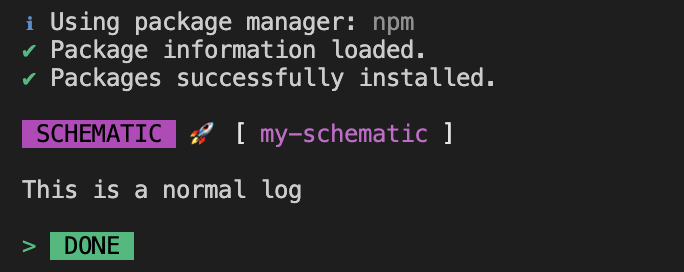
import { log, schematic, workspace } from '@hug/ngx-schematics-utilities';
import { Rule } from '@angular-devkit/schematics';
export default (options: any): Rule =>
schematic('my-schematic', [
log('This is a normal log'),
// Using chainable
workspace()
.log('This is a normal log')
.toRule()
]);
logInfo
Outputs a message to the console, prefixed by the word "INFO" printed in blue.
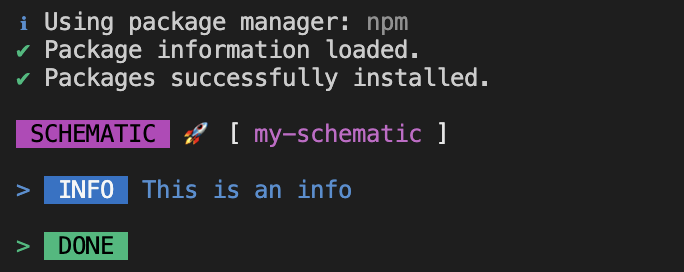
import { logInfo, schematic, workspace } from '@hug/ngx-schematics-utilities';
import { Rule } from '@angular-devkit/schematics';
export default (options: any): Rule =>
schematic('my-schematic', [
logInfo('This is an info'),
// Using chainable
workspace()
.logInfo('This is an info')
.toRule()
]);
logWarning
Outputs a message to the console, prefixed by the word "WARNING" printed in yellow.
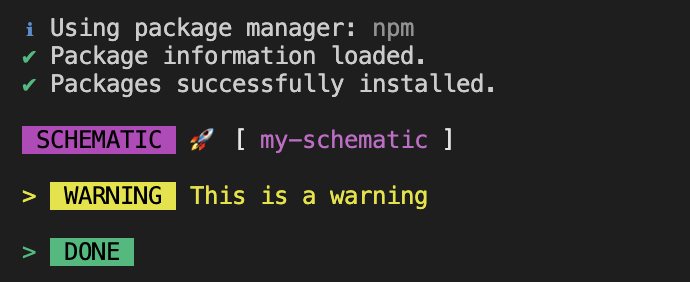
import { logWarning, schematic, workspace } from '@hug/ngx-schematics-utilities';
import { Rule } from '@angular-devkit/schematics';
export default (options: any): Rule =>
schematic('my-schematic', [
logWarning('This is a warning'),
// Using chainable
workspace()
.logWarning('This is a warning')
.toRule()
]);
logError
Outputs a message to the console, prefixed by the word "ERROR" printed in red.
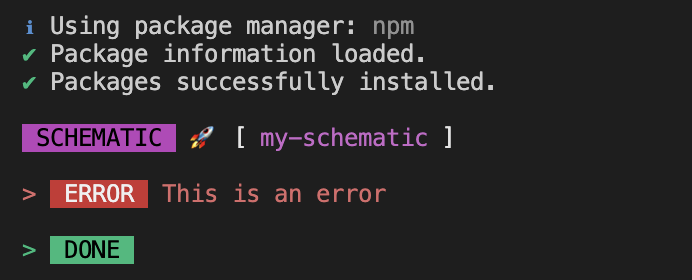
import { logError, schematic, workspace } from '@hug/ngx-schematics-utilities';
import { Rule } from '@angular-devkit/schematics';
export default (options: any): Rule =>
schematic('my-schematic', [
logError('This is an error'),
// Using chainable
workspace()
.logError('This is an error')
.toRule()
]);
logAction
Outputs a message to the console, prefixed by the word "ACTION" printed in yellow.
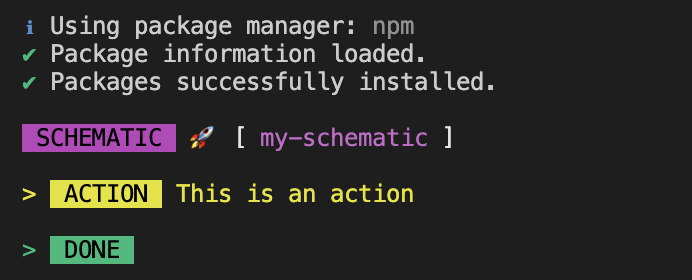
import { logAction, schematic, workspace } from '@hug/ngx-schematics-utilities';
import { Rule } from '@angular-devkit/schematics';
export default (options: any): Rule =>
schematic('my-schematic', [
logAction('This is an action'),
// Using chainable
workspace()
.logAction('This is an action')
.toRule()
]);
spawn
Spawns a new process using the given command and arguments.
By default, the output will not be redirected to the console unless otherwise specified by the showOutput
parameter or the --verbose current schematic process argument.
When the output is not redirected to the console, an animated spinner will be displayed to the console to indicates the current process activity, as well as the command and its options displayed inlined and printed in cyan.

import { spawn, schematic, workspace } from '@hug/ngx-schematics-utilities';
import { Rule } from '@angular-devkit/schematics';
export default (options: any): Rule =>
schematic('my-schematic', [
// Display an animated spinner along with the command and its arguments
spawn('ng', ['add', '@angular/material', '--skip-confirmation']),
// Display the command outputs directly to the console
spawn('npx', ['-p', 'package-name', 'some-command'], true)
// Using chainable
workspace()
.spawn('sleep', ['4'])
.toRule()
]);
runAtEnd
Executes a rule at the very end of the schematic.
Beware that most of the helper rules won't work here (especially those that manipulate the tree).
Because, at that time, the Angular schematic has already finished running.

import { runAtEnd, logAction, schematic, workspace } from '@hug/ngx-schematics-utilities';
import { Rule } from '@angular-devkit/schematics';
export default (options: any): Rule =>
schematic('my-schematic', [
runAtEnd((): Rule => {
...
})),
// Using chainable
workspace()
.runAtEnd(logAction('Have a look at `./package.json` file and make modifications as needed.'))
.toRule()
]);
Helpers
getSchematicSchemaOptions
Returns all the options of a specific local or external schematic's schema.
import { getSchematicSchemaOptions, schematic } from '@hug/ngx-schematics-utilities';
import { Rule, SchematicContext, Tree } from '@angular-devkit/schematics';
export default (options: any): Rule =>
(tree: Tree, context: SchematicContext): Rule =>
schematic('my-schematic', [
async (): Rule => {
// Get the `ng-add` schema of the current running schematic
const opts1 = await getSchematicSchemaOptions(context);
// Get the `schematic-name` schema of the current running schematic
const opts2 = await getSchematicSchemaOptions(context, 'schematic-name'));
// Get the `ng-add` schema of the local package `@angular/material`
const opts3 = await getSchematicSchemaOptions(context, 'ng-add', '@angular/material'));
// Get the `sentry` schema of the external package `@hug/ngx-sentry` on npm
const opts4 = await getSchematicSchemaOptions(context, 'sentry', '@hug/ngx-sentry', true));
...
}
]);
getSchematicSchemaDefaultOptions
Returns all the default options of a specific local or external schematic's schema.
import { getSchematicSchemaDefaultOptions, schematic } from '@hug/ngx-schematics-utilities';
import { Rule, SchematicContext, Tree } from '@angular-devkit/schematics';
export default (options: any): Rule =>
(tree: Tree, context: SchematicContext): Rule =>
schematic('my-schematic', [
async (): Rule => {
// Get the default options from the `ng-add` schema of the current running schematic
const opts1 = await getSchematicSchemaDefaultOptions(context);
// Get the default options from the `schematic-name` schema of the current running schematic
const opts2 = await getSchematicSchemaDefaultOptions(context, 'schematic-name'));
// Get the default options from the `ng-add` schema of the local package `@angular/material`
const opts3 = await getSchematicSchemaDefaultOptions(context, 'ng-add', '@angular/material'));
// Get the default options from the `sentry` schema of the external package `@hug/ngx-sentry` on npm
const opts4 = await getSchematicSchemaDefaultOptions(context, 'sentry', '@hug/ngx-sentry', true));
...
}
]);